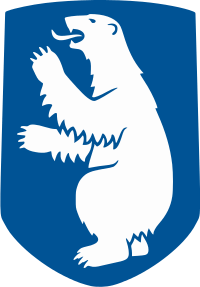Inuktun
| Polar Inuit | |
|---|---|
| Inuktun | |
| Native to | Northern Greenland |
| Region | Qaanaaq area |
| Ethnicity | Inughuit |
Native speakers | 800–1,000 (1995)[1] |
| Official status | |
Official language in | Greenland (Denmark) |
| Language codes | |
| ISO 639-3 | – |
| Glottolog |
pola1254[2] |
|
Inuit dialects. Inuktun is brown. | |
Inuktun (English: Polar Eskimo, Greenlandic: avanersuarmiutut, Danish: nordgrønlandsk, polareskimoisk, thulesproget) is the language of approximately 1,000 indigenous Inughuit, inhabiting the world's northernmost settlements in Qaanaaq and the surrounding villages in northwestern Greenland.[3]
All speakers of Inuktun also speak Standard Greenlandic and many also speak Danish and a few also English. Apart from the town of Qaanaaq, Inuktun is also spoken in the villages of Muriuhaq, Hiurapaluk, Qikiqtat, Qikiqtarhuaq, Havighivik (names given in Inuktun).
The language was first described by the explorers Knud Rasmussen and Peter Freuchen who travelled through northern Greenland in the early twentieth century and established a trading post at Dundas in 1910. Inuktun does not have its own orthography and is not taught in schools. However, most of the inhabitants of Qaanaaq and the surrounding villages use Inuktun in their everyday communication.
The language is an Eskimo–Aleut language and dialectologically it is in between the Greenlandic Kalaallisut and the Canadian Inuktitut. The Polar Inuit were the last to cross from Canada into Greenland and they may have arrived as late as in the eighteenth century.[4] The language differs from Kalaallisut by substituting Kalaallisut /s/ with an h-sound often pronounced like a palatal fricative as in German ich. Inuktun also allows more consonant combinations than Kalaallisut and has some minor grammatical and lexical differences.
Phonology
Vowels
| Front | Central | Back | |
|---|---|---|---|
| Close | i | u | |
| Open | a | ||
Consonants
Apart from the simple consonants given below, there are also 5 consonants which exist only in consonant clusters: /s/ ⟨ss⟩, /ts/ ⟨ts⟩, /ɣ/⟨gh⟩, /ʁ/ ⟨rh⟩, and /ɴ/ (⟨rng⟩) (a uvular nasal).
| Labial | Alveolar | Palatal | Velar | Uvular | Glottal | |
|---|---|---|---|---|---|---|
| Plosive | /p/ | /t/ | /k/ | /q/ | ||
| Fricative | /v/ | /ɣ/ | /h/ | |||
| Nasal | /m/ | /n/ | /ŋ/ | |||
| Approximant | /l/ | /j/ | /ʁ/ | |||
Notes
- ↑ 770 in Greenland, and perhaps 20% more in Denmark. Greenlandic at Ethnologue (16th ed., 2009)
- ↑ Hammarström, Harald; Forkel, Robert; Haspelmath, Martin; Bank, Sebastian, eds. (2016). "Polar Eskimo". Glottolog 2.7. Jena: Max Planck Institute for the Science of Human History.
- ↑ Erik Holtved. Remarks on the Polar Eskimo Dialect. International Journal of American Linguistics. Vol. 18, No. 1 (Jan., 1952), pp. 20-24
- ↑ Fortescue 1991. page 1
References
- Fortescue, Michael, 1991, Inuktun: an introduction to the language of Qaanaaq, Thule, Institut for Eskimologi 15, Københavns Universitet
External links
- Pax Leonard, Stephen. "Scientist lives with Arctic Innuguit for a year to document and help save disappearing language." The Guardian.

